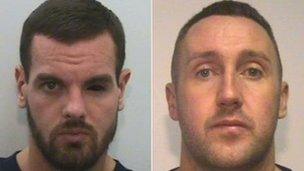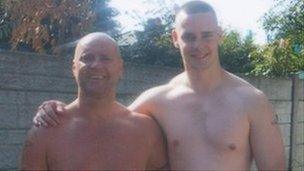Dale Cregan: The criminal feud that led to four murders
- Published
Police have issued CCTV footage from the second attack in an appeal for witnesses to come forward.
A "ruthless and intimidating lead player in the criminal underworld", Dale Cregan was known and feared by people long before he became notorious as the killer of two policewomen and two members of a rival local family.
Mr A, who asked to remain anonymous for fear of reprisals even after Cregan was jailed, lived in the same part of Greater Manchester as the multiple killer.
He said Cregan made it obvious he was "ready and willing openly to use violence to get his own way" - but no-one had really thought he was capable of the four brutal murders he admitted carrying out last summer.
Cregan, 29, pleaded guilty part-way through a trial to killing father and son Mark and David Short in separate attacks before going on the run and murdering police officers Nicola Hughes and Fiona Bone.
According to Mr A, Cregan "ran things" in Tameside and would "walk around the community making people feel uncomfortable, staring at people".
Knee cap blown off
A stare also sparked the decade-long feud between the Short family and the Atkinsons - friends of Cregan - that led to the killings.
Leon Atkinson hit David Short in the face in 2001 for "looking at him", the jury heard during the 12-week trial, creating a simmering tension between the two east Manchester families.

The feud began with Leon Atkinson (right) and escalated when Dale Cregan (left) got involved
"We had another fight after that", Atkinson told Preston Crown Court; "I had a fight with one of their nephews… two of their nephews. My brothers had fights with his cousins or nephews."
The feud escalated in September 2003 when Atkinson's father Francis was shot in the leg, his left knee cap "blown across" a pub.
David Short thought Atkinson's "right hand man" Cregan was responsible for a serious attack on him when he was run off his bike and had his throat cut, the court heard.
Even so, an uneasy truce was called when Atkinson and David Short shook hands in Manchester's Arndale Centre, in 2008.
"We just said there was no use in fighting," Atkinson said on the witness stand.
But, war broke out again in 2012 during a drunken pub row.
'You're all dead'
Theresa Atkinson - dubbed the "matriarch" of the family - threw a bottle at another member of the Short family, Raymond Young, who slapped her.
Mark Short was shot dead as he played pool in the Cotton Tree Inn, Droylsden
The court heard Ms Atkinson warned him: "I'm going to get my boys - you're all dead."
Phone records showed she called her son Leon and another son hours later, and the following morning Atkinson spoke to his mother again before contacting Cregan.
Twelve days later the Short family and friends gathered at the Cotton Tree pub in Droylsden.
Cregan, Luke Livesey and Damian Gorman - known as Scarface - pulled up in a car outside.
Shortly afterwards a balaclava-clad gunman entered the pub, fatally shooting Mark Short and also hitting three other men.
David Short, in the toilets during the shooting, emerged unscathed to see his son die in his arms.
Grenade 'calling card'
Despite being a "lead player" among local criminals, Cregan feared retaliation attacks and decided to kill David Short to prevent this.
Greater Manchester Police said they issued Mr Short with three "threat to life" warnings, believing his life could be in danger.
The force gave out 130 such warnings in 2012 and the same number in 2011 - more than the Metropolitan Police.
In August, Cregan and Anthony Wilkinson emerged from a van parked outside Mr Short's Clayton house and opened fire.
He was chased through the house and back outside, shot at least nine times and a grenade was thrown on to his body where he lay.
A second grenade was thrown at another house in nearby Luke Road, Droylsden, 10 minutes later, though no-one was hurt.
The grenade was to become Cregan's grim "calling card" and PCs Fiona Bone and Nicola Hughes would not be spared that method of attack.
'Rape son' threat
During the trial Dr James Collins, a consultant forensic psychiatrist, said Cregan told him David Short was killed after making threats against his family.
During their conversations Cregan said: "After I killed Mark Short, he said he would rape my son, he said he would set him on fire.
"I couldn't get him out of my head. I thought if I kill him, maybe I will get a rest.
"He threatened my whole family. He told me 'The gloves are off'. So I was always going to kill him.

David Short was killed for threatening Dale Cregan's family after son Mark was killed, the jury heard
"The night I shot David Short I had the best sleep of my life."
After the murder, Cregan and Wilkinson went on the run and became the most wanted fugitives in the country.
Wilkinson gave himself up to police first and, after a month in hiding, Cregan finally handed himself in after murdering the two police officers having lured them to the scene with a false report of a burglary.
The only explanation offered: "You were hounding my family so I took it out on yous," though he later added he was "sorry about those two that have been killed, I wish it was men".
'Strange moral code'
Consultant criminal psychologist Elie Godsi said Cregan displays all the characteristics of a psychopath and may have killed the PCs because "he wanted to go out in some sort of distorted blaze of glory and gain notoriety for himself".
He said: "In the criminal underworld there is not only people taken out because of turf wards and disputes... there's also a very strange moral code where people mustn't be offended, you must save face.
"Perhaps in some circles the murder of police has some sort of kudos attached to it.
"Grandiosity is central to the behaviour of psychopaths because usually their lives are quite pathetic, empty and meaningless... so they have to create a very distorted sense of their own self-worth.
"The other side of that is that other people are not important to them."
However, not much is known about Cregan's past.
Mr A said people were too intimidated to go to the police about his threats.
He added: "People don't want to get involved do they, and to be labelled a grass, I guess that's one thing.
"But also the repercussions. The police aren't there 24/7.

PC Fiona Bone and PC Nicola Hughes were killed on 18 September
"Sometimes there's nothing the police can do... and they're not in the neighbourhood at 10 o'clock at night when they come and give you a knock on the door or are just generally intimidating you.
"It's uncomfortable, it's psychological. He was ruthless and people were scared of him and that's what he wanted. Basically the reputation he wanted was that he ran things in that area and by all accounts he did.
"He was in control of a lot of the drugs coming in and out of the area."
But his "associates" looked up to him and his lifestyle was attractive to young people.
Mr A said it was hard for normal people seeing "people like Cregan, living a lifestyle that was far beyond most people's means".
"Trips away, decent cars, I mean it was pretty obvious what people are up to when you go to school or the nursery in the morning and someone turns up in a 4x4 with a blazing suntan," he said.
"It's attractive because that's what we see on our televisions every day, that's what we measure success by... what car you drive and what clothes you're wearing."
- Published27 March 2013
- Published5 March 2013
- Published14 February 2013
- Published13 February 2013
- Published12 February 2013